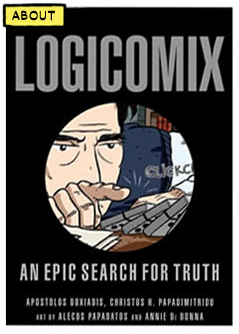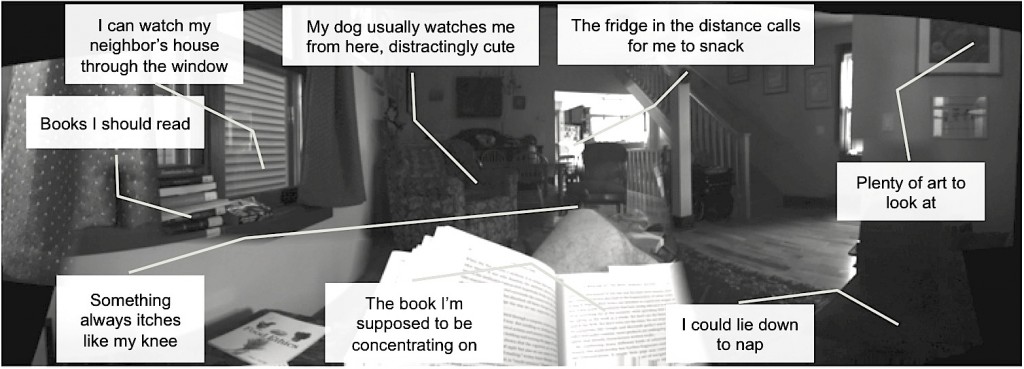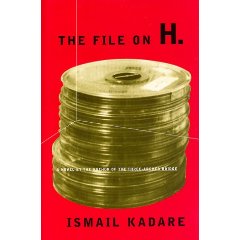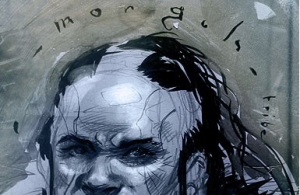Dan Cohen has written a good summary of the latest fuss over electronic books, The Fight Over the Future of Digital Books. He explains the latest suit by the Authors Guild against the HathiTrust. This suit is the companion to the suit by the Authors Guild of Google that has still not been resolved.
Category: Literature
LOGICOMIX: philosophical comics

Sean lent me LOGICOMIX (Doxiadis, Apostolos, et al. New York: Bloomsbury, 2009), a graphic novel about Bertrand Russell and logic. The comic novel has a series of frames, the outer of which is a discussion between the real authors about logic and passion. They end up going to see Orestes and the novel ends with Athena’s judgement that brings the fates (passion and revenge) together with reason into wisdom in a city (Athens) through justice.
This frame echoes the main internal story which is Russell’s struggle to found math in logic. Much of the novel is a tour through the history of logic and important paradoxes. This tour runs in parallel with a biography of Russell. At all levels the novel seems to argue that you have to balance passion with reason. Russell tried to do it in his life, logicians discovered there was no logical foundation with paradoxes, and the graphic novel uses comic art to illustrate the story of logic (hence “logicomix”.) There is dog called “Manga” (which apparently in Greek means “cool dude”) who chases the owl (of reason.)
Distractions in the Shallows
I’ve was slowly reading Nicholas Carr’s The Shallows when I came across this passage,
By combining many different kinds of information on a single screen, the multimedia Net further fragments content an disrupts our concentration. (p. 91)
As often happens when reading, questions disrupted my concentration. I couldn’t help thinking that Carr’s gaze was limited by the screen. How many distractions are there beyond the book and screen. I grabbed my iPhone and took a panoramic shot of the visual space from where I sat on the living room couch. Rooms are the problem – they are filled with multimedia and interactive distractions starting with the couch (which invites me to put down the book and snooze.) Here is my annotated “multimedia” space (click to enlarge):
Amazon and Waterstones report downloads eclipsing printed book sales
So, ebooks are finally taking off! The Guardian reports that Amazon and Waterstones report downloads eclipsing printed book sales . This doesn’t mean that the value of print sales has been surpassed, but it is still indicative that ebooks are here to stay.
Now, can we redesign the book for the ereader? The current crop of ebook readers are page turners that don’t use the medium. Instead the medium has been made to work like the book and perhaps that is right, but I would still like to see something more interesting. Here are some ideas:
- e-audio-books – ebooks that come with either voice synthesis or synchronized audio so that you can listen or read them.
- An API for reading apps so that you could buy apps that work with all your ebooks. The apps might allow you to search across books or visualize books. There might be apps that quiz you with random quotes or help you pull linked data out of a book.
- A standardized way of citing passages in an ebook.
The File On H.: Ismail Kadare
I’ve been meaning for years to blog about Ismail Kadare’s The File On H.. This short book is, I believe, Kadare’s response to the naive views about orality and primitive societies of people like Lord and Parry. Kadare apparently met them at a conference and there is no doubt that the book is some sort of literary response to their study of oral storytelling in the Balkans. The authors of the Wikipedia entry on the book seem to feel that Kadare was trying to alert us to the Albanian oral traditions that Lord and Parry ignored for the Serbo-Croatian ones. I think he was making fun of American academics trying to recover some noble and original orality and also trying to show that there is a continuity between oral storytelling and the constant spying on people of a police state.
<Spoiler Alert>Technology, this time magnetic tape recording, plays an important part in the plot. The two academics bring this new type of machine to Albania to record the local rhapsodes. A jealous Serbian monk stirs up trouble and the recordings get shredded. Ironically, while the two academics have nothing to left when they leave Albania, one of them has caught the bug and been infected with orality. They may not have recordings, but they have learned to do it. Which is the more useful?
Making Books : Encyclopaedia Britannica Films : Free Download & Streaming : Internet Archive
On Boing Boing I cam across a reference to this Encyclopedia Britannica short video on Making Books (Encyclopaedia Britannica Films, 1947). It is remarkable how many specialized machines there were for printing books. Nicely reminds us of a moment in the history of information technology.
what you are missing – bookforum.com / in print
Bookforum has a thoughtful review of Jane McGonigal’s book, Reality if Broken, titled What You Are Missing: The utopian visiion of one ardent proponent of gamification by Clay Risen (Feb/Mar 2011). Risen is critical of the view that we can transform learning by gamifying it.
Like a lot of hard-core gamers, McGonigal believes that game worlds offer something better than reality: “In today’s society, computer and video games are fulfilling genuine human needs that the real world is currently unable to satisfy.” One could say the same about a drug high—indeed, McGonigal often mimics the chatter about marijuana’s world-altering potential common to freshman dorm rooms. Still, if she’s right, it’s only because, as real as some games look and as human as some of their characters appear, games are by design not real. Huge chunks of the human condition have been left out. Decisions have been simplified. Despair, anger, jealousy—emotions like these are engineered out of the gaming experience, not because game companies want to turn us into zombies, but because that’s what we demand: escape into a simplified existence from the messy disappointment of reality. Simply put, video games can’t help us change the world if they’re designed to divorce us from it.
I share the skepticism about the transformative power of gamifying things. Some of the issues we need think about are:
- Anyone who has taught K-12 has already tried gamifying with stickers, friendly competitons, using games and so on. It is already in the portfolio of a good teacher to try to make things playful.
- Games and simulations may work to teach some topics but it is likely that they won’t work for others. Flight simulators are examples of simulations that are clearly useful, but they work because we can actually model success on a computer. We cannot, however, model success in writing which means that games for writing are limited to gamifying things, not actually providing useful feedback.
- If we gamify things then we risk making gaming the least fun thing around. Gamification sounds like an Orwellian plot to dress up exploitation as play. Most people will see through it at the expense of serious attempts at serious games.
- Play is not work. Work dressed up as play is still work. At the end of the day it is a waste of money to dress things up instead of facing work as work.
Tom McCarthy: International Necronautical Society
One of the people short-listed for the Man Booker prize is Tom McCarthy who, among other things created the International Necronautical Society. This “semi-ficticious organization” reminds me of OULIPO. They are “in our house” and recruiting. They have a lovely Joint Statement on Inauthenticity. A necronaut according to the Urban Dictionary is an “Annoying hacker and general asshole in Counter-Strike and other online games.” Or it could be someone who navigates death.
They have a Twitter feed, twitter.com/necronauts
Stephenson, Subutai, The Mongoliad
Thanks to Slashdot I have been poking around a project that one of my favorite sci-fi authors is involved in, namely the serially online published project The Mongoliad.This work is being supported by a company Stephenson helped create called Subutai Corporation that has developed a platform called PULP for digital novels that have social aspects and multimedia extensions. The platform looks a lot like a structured wiki. The first materials for The Mongoliad are up and smartphone apps are supposed to be coming. I found it hard to read off the web, but I tend to like my sci-fi on pulp.
It will be interesting to see how they explore the medium for this multi-authored novel.
The New York Times has a good story on the project here.
Jenkins: It’s time for Canada’s digital revolution
I came across this older article by Tom Jenkins from Globe and Mail that makes the case for investment in digital content. The article, It’s time for Canada’s digital revolution (Monday, March 2, 2009), is by Tom Jenkins, executive chairman and chief strategy officer of Waterloo’s Open Text Corp. He is also on the SSHRC council.
The Obama administration has made IT infrastructure and digital content a top and multibillion-dollar priority. The European Union has just launched a massive expansion in European digital content as part of its digital commercialization strategy. With only 1 per cent of Canada's content on the Web, we are falling behind the rest of the world as other countries pull ahead in the race to put their information online. Canada must keep pace in the fast-moving digital revolution. …
Library and Archives Canada, with strong support from the private and university sectors, has a plan to digitize Canadian content and is ready with the digital equivalent of a shovel-ready knowledge infrastructure project. It is time to implement. To succeed, we have to move quickly to take advantage of our strengths and opportunities.
This is the first public mention I’ve seen of an initiative to digitize Canadian content on a large scale. There has been discussion that OpenText (which got started with the New OED project) would support such a project. Let’s do it!




